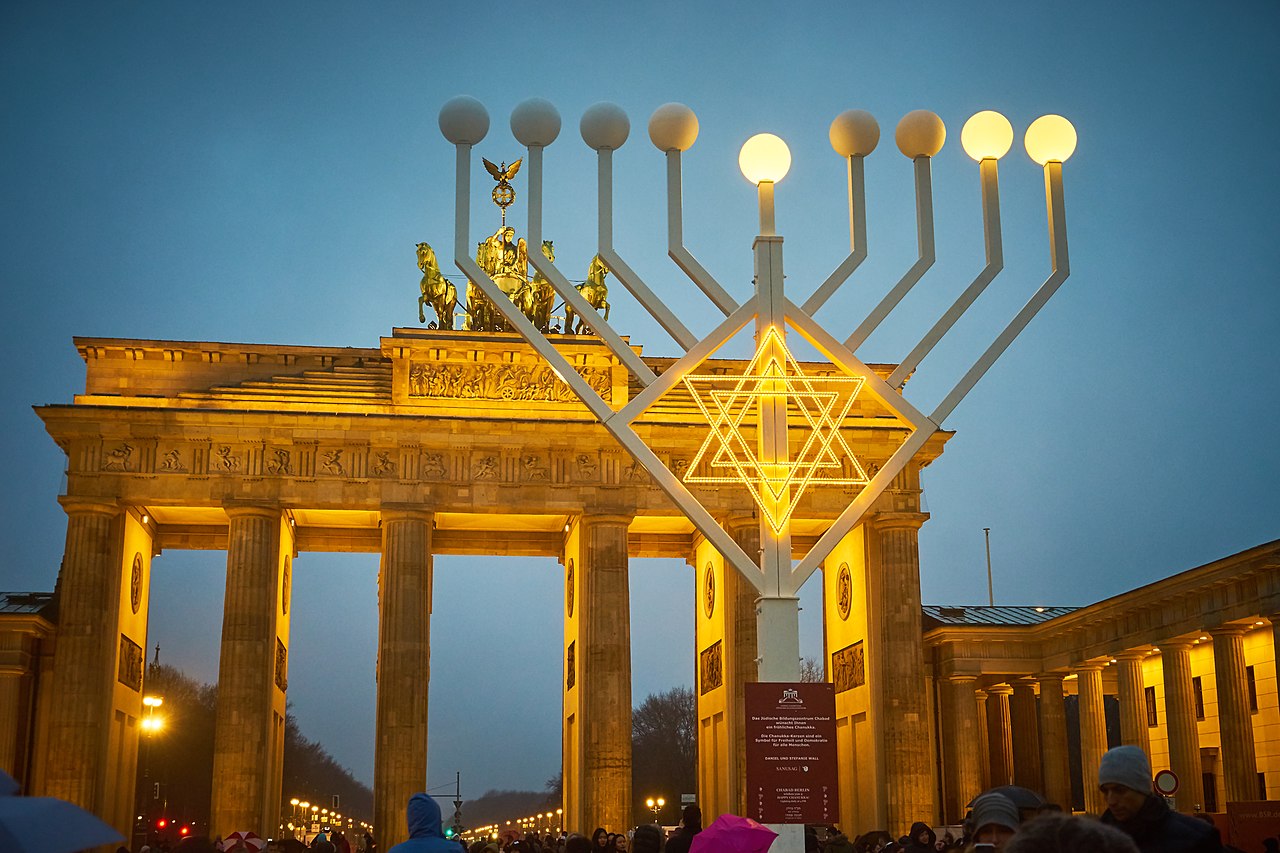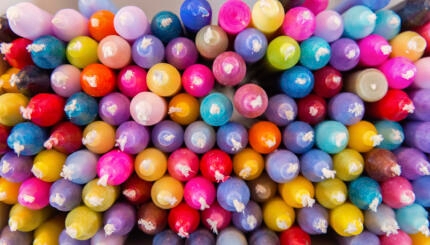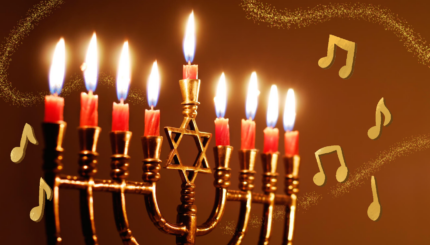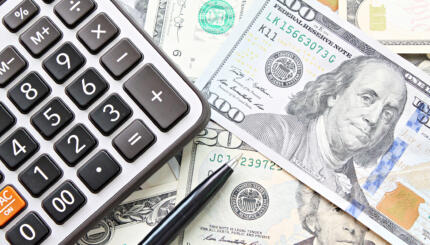The Talmudic explanation of the laws and significance of Hanukkah in Tractate 21a-24a appears almost as an afterthought amidst a discussion of appropriate wicks and oils for Sabbath lights. Yet in this sole discussion of in the , the rabbis seem to be pursuing a definite agenda as they debate the details of the Hanukkah ritual — they are creating the ritual that will embody the meaning of the holiday. And for the rabbis, the spiritual goal of the Hanukkah ritual is to publicize the miracle of the oil (in Aramaic, pirsumay nisa).
Publicizing the miracle is so critical for the rabbis that they are willing to say that in certain situations kindling the Hanukkah lights takes precedence over that mainstay of Jewish ritual — reciting Kiddush over wine on the Sabbath. If a person does not have sufficient funds for both oil and wicks for the hanukkiyah (Hanukkah ) and wine for Kiddush, the rabbis recommend kindling the Hanukkah lights instead of making Kiddush. As the sage Rava thought through these issues:
Rava inquired: Where the choice is between kindling a Hanukkah light and sanctification of the Sabbath day by blessing the wine, what is the law? Is sanctification of the Sabbath day preferable since it is a frequent obligation (whereas kindling the Hanukkah lights is only an annual event)? Or perhaps kindling the Hanukkah light is preferable since its purpose is publicizing the miracle that God wrought for the Jewish people?
After Rava asked this question, he himself resolved it: Kindling the Hanukkah light is preferable, since its purpose is publicizing the miracle.
Shabbat 23b
Where to Light the Candles
The rabbinical goal of publicizing the miracle even has implications for something so seemingly inconsequential as where Hanukkah flames are to be lit. For the rabbis, the lights must be kindled where they are to be displayed so that act and intent are one; and appropriate placement of the burning lights means making them visible from the public thoroughfare. Consequently, the lights should be kindled either at the outer doorway of one’s home or, if the home fronts onto a courtyard, then at the entrance to the courtyard.
Someone who lives on an upper floor is expected to kindle the lights in a window adjacent to the public thoroughfare. Because the purpose of the lights is to make a public statement, the only time that a person is allowed to light the candles “on his table” is in a time of danger.

Help us keep Jewish knowledge accessible to millions of people around the world.
Your donation to My Jewish Learning fuels endless journeys of Jewish discovery. With your help, My Jewish Learning can continue to provide nonstop opportunities for learning, connection and growth.
To ensure that the Hanukkah lights are kindled solely for the sake of publicizing the miracle, the rabbis mandate that they not be used to provide light for any other activity, even study. Some rabbis argued that using the Hanukkah lights for another purpose was, in effect, treating them disrespectfully; others saw the Hanukkah lights as a commemoration of the Temple menorah, whose light could not be used for other activities, even sacred ones.
The rabbis, therefore, required that another light be lit in the room where the Hanukkah lights are lit, so that its light would be used and not that of the hanukkiyah. This additional light was eventually called the shamash, or helper light, which is the extra, ninth light in every hanukkiyah. Whereas the other eight lights fulfill the commandment, or mitzvah, of kindling the Hanukkah lights, the provides light for other activities, including the kindling of the other lights.
Olive Oil
Another observation made by the rabbis may also be tied to their goal of publicizing the miracle. Although any type of oil is allowed for the Hanukkah lights, the rabbis considered olive oil to be the choicest. Why? Because, they said, it produces “a clearer and brighter light.” Although not explicitly stated, one might guess that a brighter light would be more effective in broadcasting the miracle.
Perhaps the rabbis also thought that stronger lights would make a deeper impression on the individuals kindling the lights. In fact, the impulse for the rabbis’ entire discussion about the procedure for kindling the Hanukkah lights seems to be their concern with how individuals experience holiness through ritual. Although the commandment to kindle the Hanukkah lights could theoretically be fulfilled by having the head of the family kindle one light each night for the entire household, the rabbis suggest that individuals will be more involved if they each light their own hanukkiya — one for each member of the family. It is interesting that the rabbis also state specifically that women are obligated to kindle Hanukkah lights because they also experienced the miracle of God’s salvation.
Shammai vs. Hillel
The rabbis felt that simply kindling one light every night would not sufficiently reflect the power of the Hanukkah miracle. The schools of Shammai and of Hillel had different ideas about how to better connect the ritual act to the miracle. The school of Shammai prescribed that on the first day of Hanukkah each person should light eight lights and then decrease the lights by one on each succeeding night. Their reasoning, as explained in the Talmud, is that the number of lights kindled on a particular night would thereby correspond to the numbers of days that remain in the miracle (including the day following the night on which the candles are being lit). Further, during the course of the actual miracle in the Temple, the oil available for the miracle decreased during each of the eight days.
The school of Hillel, on the other hand, suggested kindling a single light on the first night and moving up to eight on the last night. The rabbis explain that the school of Hillel was focusing on enumerating the days of the miracle that had already passed rather than those yet to come. But the clincher, the reason that the school of Hillel won out (as it did in most disputes with the school of Shammai), is that it seemed to better understand the human experience of the miraculous. Their reason for increasing the number of lights each night was that “in sacred matters we elevate, and do not lower [the degree of holiness].” Personal meaning is created in the details of the ritual act, and the rabbis’ goal seemed to be to develop the most intense connection possible between ritual act and spiritual intention.
In the rabbis’ discussion of the blessings to be said before kindling the lights, they make an interesting aside that suggests how aware they were of their own power over future Jewish practice. The Talmud asks why the blessing over the lights includes words to the effect that God commanded us to kindle the Hanukkah lights if the holiday is not mentioned in the Bible:
What blessing does one utter when performing the of kindling the Hanukkah lights? One blesses: ‘Blessed are you, our God, king of the universe, who has sanctified us with His commandments and has commanded us to kindle the Hanukkah light.’ But where in the Torah did God so command us?
The rabbis’ response is to bring two verses from the Torah as proof-texts to justify viewing themselves as channels for God’s word: “You shall not deviate from the word that they [the rabbis] will tell you” (Deuteronomy 17:11) and “Ask your father and he will tell you, your elders and they will say to you” (Deuteronomy 32:7). Through these bold words the rabbis are legitimizing themselves as the arbiters of God’s word and creators of rituals that embody God’s intentions, both for Hanukkah and for all the rest of Jewish life and practice.
Explore Hanukkah’s history, global traditions, food and more with My Jewish Learning’s “All About Hanukkah” email series. Sign up to take a journey through Hanukkah and go deeper into the Festival of Lights.
Chabad-Lubavitch
Pronounced: khuh-BAHD loo-BUV-itch (oo as in boot), Hasidic sect known for its outreach to the larger Jewish community.

Help us keep Jewish knowledge accessible to millions of people around the world.
Your donation to My Jewish Learning fuels endless journeys of Jewish discovery. With your help, My Jewish Learning can continue to provide nonstop opportunities for learning, connection and growth.




